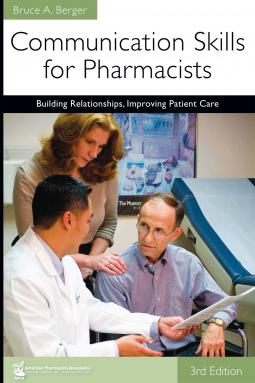
Communication Skills for Pharmacists:
Building Relationships, Improving Patient Care, 3rd Edition
by Bruce A. Berger
This title was previously available on NetGalley and is now archived.
Send NetGalley books directly to your Kindle or Kindle app
1
To read on a Kindle or Kindle app, please add kindle@netgalley.com as an approved email address to receive files in your Amazon account. Click here for step-by-step instructions.
2
Also find your Kindle email address within your Amazon account, and enter it here.
Pub Date Jan 15 2009 | Archive Date Mar 08 2022
Description
"This is a well-written and easy-to-read book, not only for pharmacy technicians already in practice seeking advancement, but also for pharmacy students who will begin intern positions."
—Patrick McDonnell, PharmD
Temple University School of Pharmacy
"This all around guide to effective counseling features useful tips and suggestions for improving patient care through effective communication, and questions for reflection at the end of each chapter."
—Matthew Perri, PhD
University of Georgia College of Pharmacy
American Journal of Pharmaceutical Education, 2006; 70 (1) Article 12
Doody’s Book Review Service Rating: ***
Communication Skills for Pharmacists: Building Relationships, Improving Patient Care, 3rd edition, includes new material that will help student pharmacists and practicing pharmacists develop the communication skills they need for providing high-quality care.
Key Features
• 15 chapters from the previous edition cover key
communication skills for pharmacists, such as listening and empathic responding,
supportive communication, persuasive communication, assertiveness, and conflict
management; provide help for patients in accepting the behavior changes needed
to manage their illness; and explore ways to become culturally competent to
provide quality care for all patients.
• A new chapter tells how to
communicate about sensitive topics that patients may find difficult to discuss
because of embarrassment, cultural beliefs, or fear of social stigma.
•
Another new chapter describes the way limited literacy or limited health
literacy can affect patient outcomes and how pharmacists can identify and help
overcome such limitations in their patients.
• The expanded chapter on
managing change emphasizes the use of motivational interviewing.
• Dozens of
examples share good and bad pharmacist–patient and pharmacist–physician
dialogues.
• Guidelines tell how to contact a physician and then build
rapport and discuss drug-related problems with him or her.
• Questions for
reflection appear at the end of each chapter.
Table of Contents
• Caring, Covenants, Codes, and Commitment
•
Developing the Relationship
• Choosing to See Patients as People
•
Listening and Empathic Responding
• Patient Counseling
• Managing the
Angry Patient
• Assertiveness
• Conflict Management
• Helping Patients
with Change
• Interacting with Physicians
• Supportive Communication
•
Choosing an Appropriate Response
• Persuasive Communication
• Immediacy:
How Word Choice and Nonverbal Cues Affect the Relationship
• Cultural
Competence
• Communicating on Sensitive Issues
• Communicating with
Patients Who Have Literacy Limitations
Marketing Plan
No Marketing Info Available
No Marketing Info Available
Available Editions
| EDITION | Paperback |
| ISBN | 9781582121321 |
| PRICE | $45.95 (USD) |



